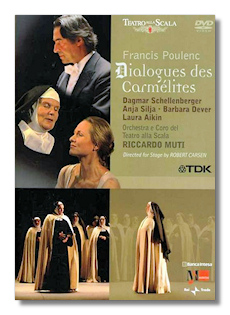
The Internet's Premier Classical Music Source
Related Links
- Poulenc Reviews
- Latest Reviews
- More Reviews
-
By Composer
-
Collections
DVD & Blu-ray
Books
Concert Reviews
Articles/Interviews
Software
Audio
Search Amazon
Recommended Links
Site News
 DVD Review
DVD Review
Francis Poulenc

Dialogues des Carmélites
- Dagmar Schellenberger (Blanche)
- Anja Silja (Madame de Croissy)
- Gwynne Geyer (Madame Lidoine)
- Mère Marie (Barbara Dever)
- Soeur Constance (Laura Aikin)
- Christopher Robertson (La Marquis de la Force)
- Gordon Gietz (Le Chevalier de la Force)
Orchestra & Chorus of La Scala Theater, Milan/Riccardo Muti
TDK DVWW-OPDOC DVD 149:00 LPCM Stereo Dolby Digital Widescreen Anamorphic
La Scala might not seem like the perfect environment for Poulenc's emotionally intimate and very French Dialogues des Carmélites, but it is good to remember that Poulenc composed this opera for La Scala, so in some ways, the staging presented here is a homecoming. Anyway, this production took place not in La Scala's regular auditorium (which was closed for renovations in February 2004, which is when this production was recorded) but in the slightly smaller Teatro degli Arcimboldi.
The direction is by Robert Carsen, who intelligently steers away from realism in favor of a production that owes more to symbolism. There are no sets to speak of; most of the atmosphere is created by lighting, a few props, and by the cast members and chorus themselves, who sometimes are on stage even when there is no musical reason for them to be there. That's alright, because Carsen does nothing to take attention away from the opera itself, and from the performances. Indeed, the final scene, in which the Carmelite nuns are guillotined one by one, is handled with wonderful restraint, thanks to a little bit of choreography. Audiences are intelligent, after all, and don't have to have the obvious thrust in their faces.
Musically, we have an international cast here, and while excellent work is done by all, that elusive French simplicity, in which little is said but much is implied, isn't consistently realized. This is true for Muti as well, who conjures beautiful oil-based colors from La Scala's orchestra when watercolors would be more fitting. One has to go back to the opera's first recording, made soon after the première and conducted by Pierre Dervaux, to hear complete justice done.
Nevertheless, I enjoyed the singing on this DVD. In the central role of Blanche de la Force, the young noblewoman whose existential fears are confronted and ultimately conquered by her service to the Carmelite order, Dagmar Schellenberger sings beautifully, although she doesn't make as much as the text as Denise Duval (the first French Blanche), and she seems a little too emotionally robust for the role. Anja Silja was 63 in early 2004, and while her voice is frayed, her Madame de Croissy owns the stage whenever she is present, particularly in her terrifying death scene. As her successor, Gwynne Geyer realizes Madame Lidoine's earthier humor and approachability. As Mère Marie, who becomes Blanche's spiritual caretaker after Madame de Croissy's death, Barbara Dever has both authority and sincere warmth. Some of Sister Constance's innocence and simplicity is missing from the portrayal of Laura Aikin (who is a well-known Lulu after all!), but she is touching in the final scene when, moments from the guillotine, she sees Blanche coming to join her in death, as Constance had foreseen she would. Gordon Gietz is excellent as Blanche's over-solicitous brother. The rest of the cast is fine, although, to paraphrase a common advertising cry, you can't tell your nuns without a program. I guess that's the point, though.
In terms of visuals and audio, this DVD leaves little to be desired, and only the occasional faux pas in the English subtitles diminishes the production values. I don't like this production as much as one from the Opéra du Rhin (Arthaus Musik 100019), which is more authentically French, but they are similar in spirit.
Copyright © 2008 by Raymond Tuttle




















